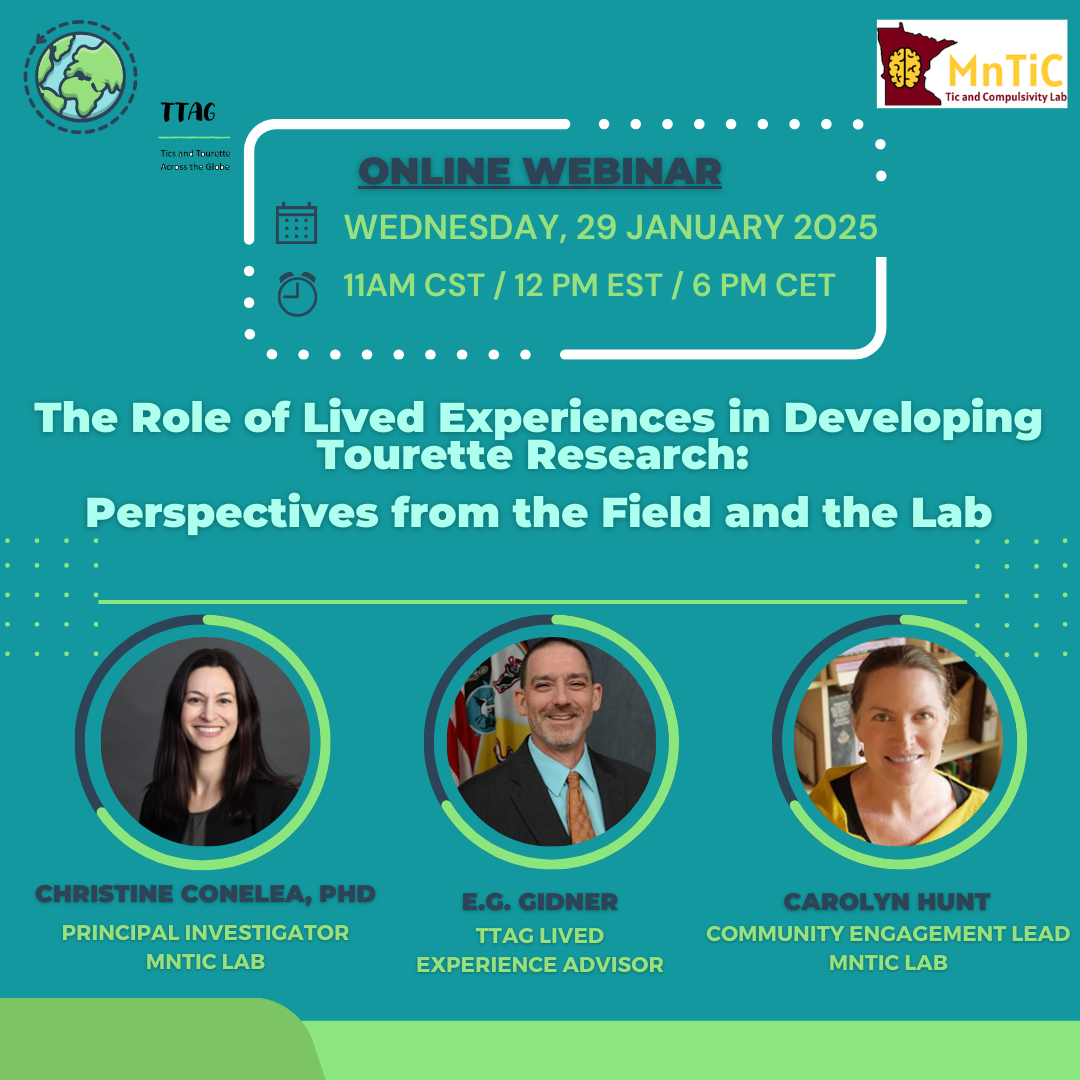TTAG: The Role of Lived Experience in Developing TS Research

About
Join Us for TTAG’s Next Webinar: The Role of Lived Experiences in Developing Tourette Research: Perspectives from the Field and the Lab
The importance of lived experience in research is becoming increasingly evident and vital. Don’t miss our next webinar and register now!
📅 Date: Wednesday, January 29th, 2025
🕒 Time: 6PM CET / 11AM CST / 12PM EST / 5PM BST
📍 Location: online event via Zoom
Our expert panelists:
- Christine Conelea, PhD – Clinical Psychologist and Associate Professor at the University of Minnesota, Pricipal Investigator at the Minnesota Tic and Compulsivity (MnTiC) Lab.
- Carolyn Hunt – Community Engagement Lead at the MnTiC Lab
- E.G. Gidner – TTAG Lived Experience Advisor
This webinar will highlight the vital role of lived experiences in shaping Tourette research and building stronger connections between researchers and the community. Through a blend of personal insights and academic perspectives, we’ll explore how real-world experiences can transform scientific advancements and guide meaningful collaboration.
What You’ll Gain:
- A deeper understanding of why lived experiences are essential in Tourette research
- Strategies for integrating lived experiences into research practices
- Insights into how you can contribute to and participate in current research projects
- An opportunity to provide input on setting research priorities that align with community needs
Join us to learn how personal stories and lived experiences are driving innovation in Tourette research and creating a shared path forward for researchers and the community alike. The talk will be concluded by a Q&A session.
About our panelists:
Christine Conelea, PhD is an Associate Professor of Psychiatry & Behavioral Sciences at the University of Minnesota and a licensed clinical psychologist. She specializes in Tourette Syndrome, tic disorders, OCD, and anxiety, focusing on how brain, environmental, and psychosocial factors influence symptoms and treatment outcomes. Her research combines behavioral and neuroscience methods, including neuromodulation and brain imaging, and aims to advance cognitive-behavioral therapy (CBT) and develop better symptom measurement tools. Outside of work, she enjoys exploring nature, drumming, word games, and spending time with her kids.
Carolyn Hunt, holds a Master’s degree in Public Administration and has a deep passion for community-engaged research. Her career began at the National Institutes of Health (NIH), where she gained expertise in health research management and building collaborations between researchers and communities. At the University of California, San Francisco, she spent 16 years managing studies at the Center for AIDS Prevention Studies and coordinating community engagement efforts, including advisory boards and partnerships. As Community Engagement Director for PRIDEnet, she developed creative initiatives to connect LGBTQ+ communities with national health research projects like The PRIDE Study and the NIH’s All of Us Research Program. Carolyn is now excited to bring her experience to the MnTiC Lab, where she’s developing innovative ways to engage and support tic communities.
E.G. Gidner brings a powerful combination of personal experience and professional expertise to TTAG and the TS community. A member of the Sault Ste. Marie Chippewa Tribe and someone living with Tourette Syndrome, he has been a key member of TTAG’s Board of Directors since its inception. Currently, he serves as the Director of the Bureau of Trust Funds Administration at the U.S. Department of the Interior, where he leads efforts to support Native American communities. His academic credentials include a law degree and a master’s in Natural Resources Policy and Management from the University of Michigan, an MBA from American University, and a bachelor’s in Zoology from Michigan State University. Residing in Arlington, Virginia, with his wife and two daughters, E.G. is deeply committed to using his expertise and lived experience to advance advocacy and meaningful change for the Tourette Syndrome community.
Online event access details will be provided by the event organiser


